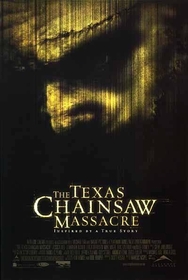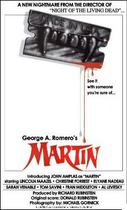Our editor-in-chief Nate Yapp is proud to have contributed to the new book Hidden Horror: A Celebration of 101 Underrated and Overlooked Fright Flicks, edited by Aaron Christensen. Another contributors include Anthony Timpone, B.J. Colangelo, Dave Alexander, Classic-Horror.com's own Robert C. Ring and John W. Bowen. Pick up a copy today from Amazon.com!
Apples and Blood Oranges: The Texas Chainsaw Article
With the prequel Texas Chainsaw Massacre: The Beginning coming out on October 6th, 2006, I thought it was just about time to take a look at the original 1974 Texas Chainsaw Massacre and its 2003 remake (The Beginning is connected to the remake).
The Texas Chainsaw Massacre remake (henceforth referred to as TCM03) should come with a warning label on it. "Do not consume within 2 months of ingesting 1974 version." The problem is that if you look at TCM03 up against the original Texas Chainsaw Massacre (TCM74), the newer film will appear to be complete crap. The social commentary is gone, the story is juiced up with sex and drugs, and it misses the almost nihilistic "s**t happens, then you die" philosophy of Tobe Hooper's seminal classic.
And yes, if you're approaching the films from a purely intellectual standpoint, TCM74 is going to win, every single time. The carnage that we all remember also stresses some important themes -- family values, the end of the hippie era, and the revenge of the underclass. I could go into the nitty-gritty academia, but I don't have the attention span and it's covered much better in Eaten Alive at a Chainsaw Massacre: The Films of Tobe Hooper by John Kenneth Muir (incidentally, nearly the exact same analysis appears in Muir's Horror Films of the 1970s).
You see, I come not to praise TCM74, but to make fruit metaphors with it. The two films are apples and oranges -- they don't compare. The original was an act of radicalism, a guerilla statement on a troubled time. TCM03, ironically enough, prefers a more conservative nostalgia, tapping into the standard "lost in the wilderness" slasher tropes for a thrilling experience that plays with the comfort zones without blasting them to hell. As such, it's actually a far more successful film than you'd imagine. It is not intended to turn the genre on its head -- it's a remake, after all -- but to provide a few shocks and a few grotesqueries in a setting we're familiar with, either through direct experience with the original or a cultural absorption of its basic layout.
Let's face it -- TCM03 has more to do with the slasher films of the 1980s than it does its predecessor. Information passes between victims so they're prepared for what's coming. There are extended chase sequences where one life is sacrificed so another may live. The Hitcher here plays out like an omen (one that goes unheeded), rather than a moment of surreal violence. The Final Girl theorem plays out to its full extent (while an argument can be made that TCM74 also has a Final Girl, she is not the master of her own destiny and is therefore not as interesting in that regard).
Then again, you could probably count the number of 80s slashers that are put together this well on one hand. Possibly two if you're being very forgiving. The fact is, TCM03 looks very pretty -- in a desiccated, charnel house sort of way (much of this is due to Daniel Pearl, who also worked on the original). The acting is usually very relevant (a term I use to describe performances that neither blow my brain nor annoy me -- acting that works in the context of it story, which is technically very good acting indeed) and where it is not relevant, it is fun (thank you, R. Lee Ermey).
TCM03 even exhibits one distinct advantage over the original -- it is far easier to watch on a whim. TCM74 is many things -- terrifying, unrelenting, sadistic, sudden... but it's also noisy. The constant screaming, yelling, and general cacophony of the "tea party" sequence does its job well in unnerving the viewer, but I've also found it to be irritating in a different way. This is a matter of effect and not a detractor to the film's overall goals, but it does make it more difficult to simply pop it in because you want to watch something that thrills with chainsaws in Texas. Here TCM03 is much more reasonable -- it contains no equivalent sequence (although The Beginning is supposed to make up for that) -- and the heroine is not reduced to blind hysteria by the events around her.
So, there you have it. A very short defense of a film that has been much maligned for what it isn't and what it was never going to be -- a revolution like the original. Better to compare TCM03 to its peers from the same year, Wrong Turn and House of 1000 Corpses. All three dip their wicks into the pool of 70s nostalgia and all are successful on one level or another, if only on the level that they are fun. Even frequently snobbish film geeks like myself have to admit that occasionally, fun is enough.








